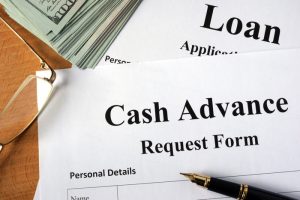Cash Advances Can Spell Trouble
 A cash advance can help you in times in need, but can also be a way to get you into deeper trouble. This can easily happen if the person or company offering the cash advance isn’t honest. There are many ads and commercials for car title loans and payday loans, many of which are legal but charge big fees and interest. If you choose to go that way, be sure to read the fine print and understand exactly what you’re signing up for, what fees are involved, and the deadline for payment.
A cash advance can help you in times in need, but can also be a way to get you into deeper trouble. This can easily happen if the person or company offering the cash advance isn’t honest. There are many ads and commercials for car title loans and payday loans, many of which are legal but charge big fees and interest. If you choose to go that way, be sure to read the fine print and understand exactly what you’re signing up for, what fees are involved, and the deadline for payment.
Is it Legal?
Some states, such as Georgia and North Carolina, have banned cash advance or payday loans. In some states, they are legal but cap high-interest rates. Others permit payday loans but have failed to close the loophole which prevents high interest rates. In other words, there is no cap on the interest you will pay for quick cash.
States Banning Loans
Arizona, Connecticut, Georgia, Maryland, Massachusetts, North Carolina, Pennsylvania, Vermont, and West Virginia have never permitted payday loans. The District of Columbia has reversed its payday law.
Interest Regulated States
- Arkansas – 17%
- New York – 25%
- Maine – 30%
- New Jersey – 30%
- Montana – 36%
- New Hampshire – 36%
- Oregon – 36%
- South Dakota – 36%
- Colorado – 45%
States with No Interest Caps
- Alabama
- Alaska
- California
- Delaware
- Florida
- Hawaii
- Idaho
- Illinois
- Indiana
- Iowa
- Kansas
- Kentucky
- Louisiana
- Michigan
- Minnesota
- Mississippi
- Missouri
- Nebraska
- Nevada
- New Mexico
- North Dakota
- Ohio
- Oklahoma
- Rhode Island
- South Carolina
- Tennessee
- Texas
- Utah
- Virginia
- Washington
- Wisconsin
- Wyoming
Online Services
Caution
The following are six things that you should be aware of when applying for a cash advance loan, in person or online.
- The lender doesn’t request payment history, pay stubs or proof of creditworthiness.
- The lender isn’t registered in your state. The Federal Trade Commission (FTC) requires registration for all lenders and loan brokers in the state(s) they do business.
- The lender requires a prepaid debit card. Some sites will ask for a prepaid card as collateral or insurance. Prepaid cards can’t be traced. They are also nonrefundable, so the scammers keep the money free and clear.
- Their website isn’t secure.
- The lender does not have an address or the address is out of the country.
- The lender demands action. Don’t fall for limited time offers.
- The lender’s phone number is not listed. Use a white pages iPhone app to find out if the number is legit.
If you think you have been scammed or want to report a lender, contact the FBI’s Internet Crime Complaint Center.